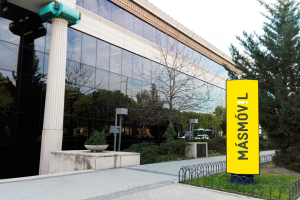
After more than 40 years of operation, DTVE is closing its doors and our website will no longer be updated daily. Thank you for all of your support.
EC approves Orange-MásMóvil merger, Telefónica slams remedies

Source: MásMóvil
The European Commission has given a green light to Spanish operator MásMóvil’s merger with Orange España following its in-depth investigation into the impact of the combination.
The EC approval is conditional of full compliance with a set of remedies promised by the pair. In particular, MásMóvil must divest spectrum in the 1,800MHz, 2m100MHz and 3.5GHz bands to MVNO rival Digi, enabling the latter to build its own mobile network and provide additional competition.
The pair must also enter an optional national roaming agreement, which Digi can decide to use or not. This is to enable Digi to provide national mobile coverage as any future network it builds on its own will not cover the entire national territory.
The remedy commitments do not include any fixed assets as Digi already has substantial fixed fibre network in the country, which it is continuing to build.
MásMóvil said it now expected the merger, which will take the form of a 50:50 joint venture, to complete by the end of this quarter.
The JV will create a new market leader in Spain in terms of number of customers, with over 30 million mobile services, 3.7 million broadband customers and 2.2 million TV customers. The combined operator will have revenues of over €7.4 billion and EBITDAaL of €2.3 billion, with an enterprise value of about €18.6 billion.

Christel Heydemann
The pair expect to realise synergies of €450 million a year.
“Today’s announcement marks a decisive moment for the group in Europe. Our joint-venture proposal with MásMóvil will create a single stronger and more sustainable player in Spain. To emerge stronger, we will be able to leverage greater scale, we will be able to innovate and we will be able to boost investment in the networks of the future to the benefit of consumers and businesses,” said Christel Heydemann, CEO of Orange.
“Good things come to those who wait! We are delighted to take on a leading role in the telecommunications sector in Spain. Our exceptional team is well equipped to create a unified and differentiated company, capable of delivering a positive impact and of offering a trusted service to continue to have the most satisfied customers in Spain,” said Meinrad Spenger, CEO of MásMóvil.
Telefónica criticises spectrum remedies
In an intervention that highlighted ongoing concern about the intense competition that has challenged operators in the market, the EC’s decision to impose spectrum-based remedies attracted criticism from the leading Spanish telco, Telefónica, with competition counsel Alejandra García Hoyos calling for a wider reflection on whether EU merger rules were still fit for purpose.
In a blog posting, García said that the environment had changed radically since the EU merger rules were last revised 20 years ago, with new risks emerging that are increasing fragmentation of the EU single market, dependence on foreign economies and a decline in European industry competitiveness.
“Telefónica believes that the new economic context reflects the weaknesses of the EU Merger Regulation, which should be revised in order to introduce a more comprehensive analysis of consumer welfare, including both the long and the short term. This implies the introduction of stronger checks and balances on DG Competition to ensure that merger control decisions are aligned with the EU policy objectives so that opportunities to create connectivity infrastructure ready for the economic and security challenges of the European Union are not missed,” said García.
She criticised the proposed spectrum remedy, involving the transfer of spectrum to Digi, arguing that the EC had “prioritized regulatory intervention over the laws of free competition in a well-functioning market and has missed the great opportunity to promote an investment-friendly market structure for telecommunication operators in Spain”.
García argued that the remedies would prevent Spanish operators “from achieving sufficient scale to make large investments in next-generation infrastructure” and cited a Spanish government decision to modify spectrum caps last year as pointing the way ahead. She also cited local regulator the CNMC’s view that “a smaller number of operators might be desirable”.


